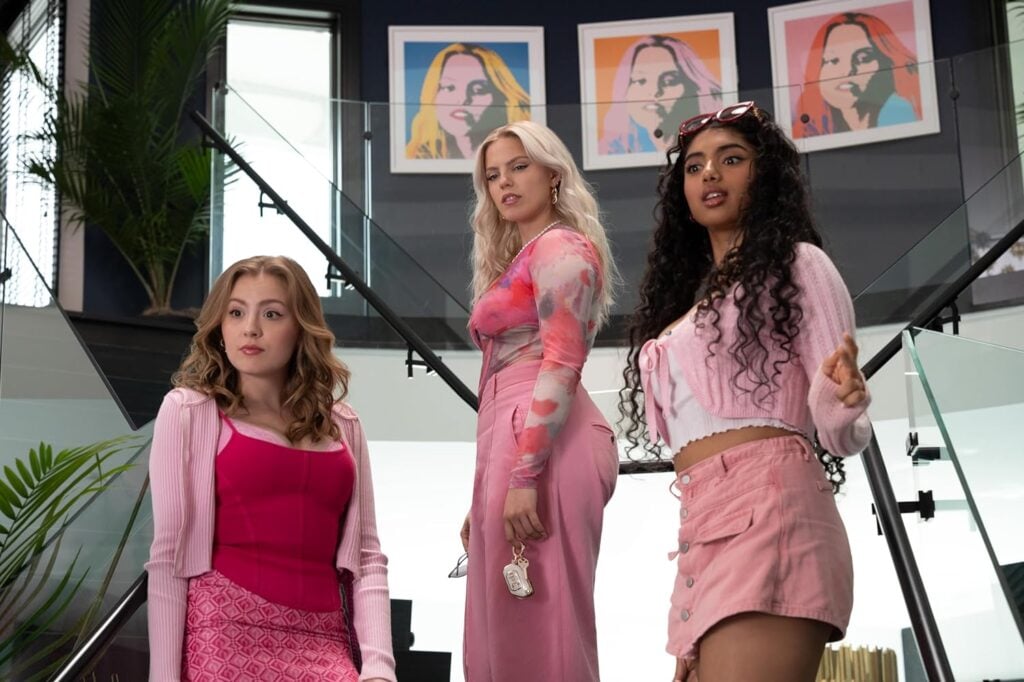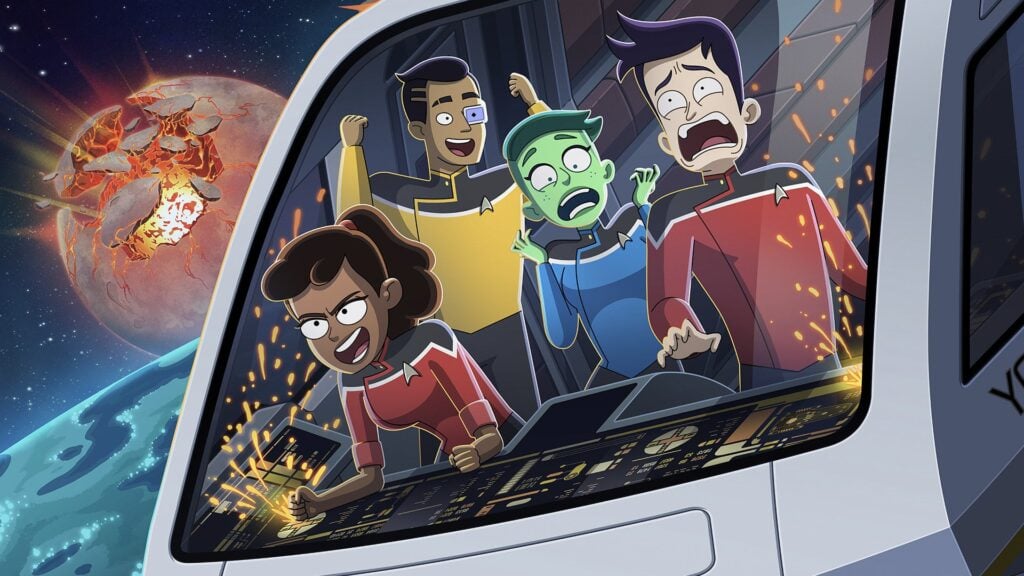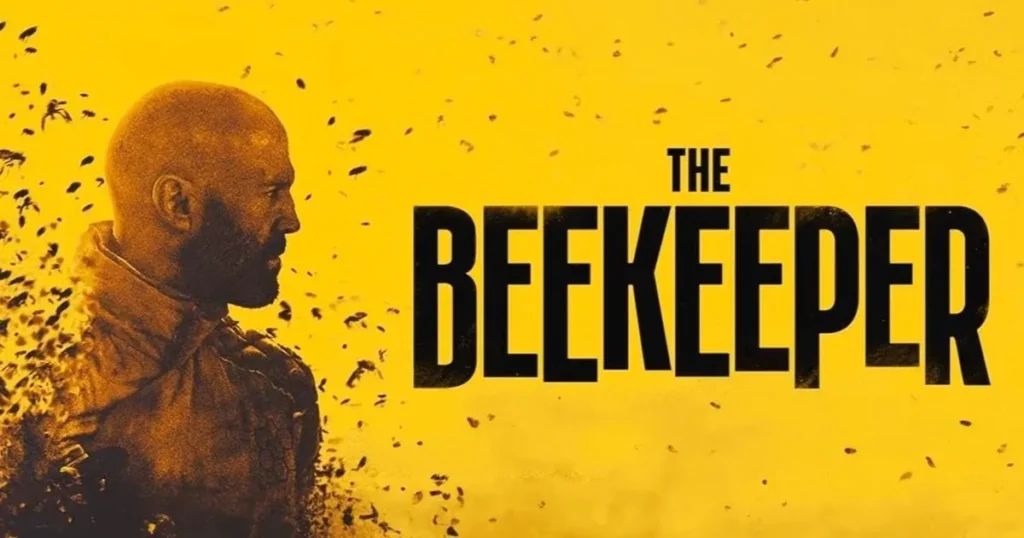Kino Lorber has released The Ida Lupino Filmmaker Collection on Blu Ray. The set contains four of Lupino’s six features directed between 1949 and 1953. I have to say to me, these films were something of a revelation. Three of the films are very good ‘social problem’ films while the sets true gem The Hitch-Hiker is a noir masterpiece. Three have been restored and look very good, with some minor variation. The fourth film The Bigamist doesn’t state that it’s been restored, but it looks like a newer scan done by elements holder Paramount.
The Production: 4/5
The only film in this set that I had seen before was 1953’s The Hitch-Hiker. The film has been in public domain for years and the copy I saw was typical of a public domain film. Because of this, I underestimated the movie.
I’ve loved movies since I was a little kid, addicted to The Late Show and denizen of revival houses and college screenings, I always was aware of Ida Lupino as an actress (she was still alive when I was discovering older movies). I knew her mostly from her 1940s Warner Bros. period. Through reading, I knew that like many actors Lupino was unhappy with the roles the studio offered her and fought for better scripts.
I also knew her from her television roles, usually guest-starring as mature, no-nonsense women who had been around the block – sort of a desexualized, older version of characters she played in the 40s. A mentor/friend of mine told me that he saw Lupino and her then-husband Howard Duff arguing in a Detroit restaurant in the 1960s while in town appearing in a local stage production. That story aligns with my image of Lupino.
I had heard she had directed some, but the only movie of note was the above mentioned The Hitch-Hiker. When I started watching these movies, I had no idea that Lupino was only the second woman admitted into the DGA. That’s truly remarkable.
Lupino was from a British show biz family. And it’s not as if her parents happened to be music hall performers – her family’s involvement in the business can be traced back a couple of centuries! Lupino started performing as a child and entered movies in her early teens.
Lupino was smart and ambitious. Dissatisfied with the roles being offered Lupino and her then-husband, Collier Young decided to branch out into independent production. The company initially named Emerald (after Lupino’s mother) later morphed into The Filmmakers.
Lupino and Collier produced their first feature, Not Wanted in 1949. Lupino shares screenwriting credit with Paul Jarrico based on a story by Jarrico and Marvin Wald. It’s the story of Sally (Sally Forrest), an alienated, working-class young woman who is seduced and discarded by traveling pianist Steve Ryan (Leo Penn). Sally is befriended by war veteran Drew Baxter (Keefe Brasselle). Baxter lost a leg in the war but has adjusted to it well.
At first, Sally finds Drew to be something of a square compared to the brooding Steve, but through Drew and his plight learns about adjusting expectations.
Not Wanted is a sensitive and sympathetic movie about an unwed mother. A topic that would normally be treated as a melodramatic cautionary tale. Lupino and Young’s script eschews the obvious sensationalism. Sally could be viewed as a female precursor to the James Dean character in Rebel Without a Cause.
Sally’s problem is that she’s young and immature with unrealistic expectations. She isn’t mean or spoiled. She knows she doesn’t want to end up like her unhappy parents and longs for a life with romance or glamour and turns to a self-centered cad who seduces, impregnates, and abandons her.
Not Wanted was originally slated to be directed by Elmer Clifton. Clifton had a heart attack just prior to production and Lupino stepped in to assume directing chores and while it appears the whole movie was directed by Lupino, she left Clifton’s name on the credits.
Never Fear, also from 1949 and written by Lupino and Young reunites Forrest and Brasselle in a story about a promising young dancer Carol Williams who contracts polio. This is a few years before the Salk vaccine and Carol undergoes a grueling rehabilitation, uncertain of its efficacy. When the film starts Carol is engaged to Guy Richards, her dance partner.
The stricken Carol slips into self-pity combined with unworthiness causing her to emotionally withdraw from Guy. Guy is willing to surrender a potentially promising career in show business to support Carol, but this only makes her more determined to cut Guy from her life.
Thematically both of Lupino’s first two films are similar. Both feature young women who experience life-changing events and have to adjust to the reality of their situations.
Lupino’s fifth feature (her third and fourth features, Outrage and Hard, Fast, and Beautiful are unfortunately not included in this set), 1953’s The Hitch-Hiker is a nightmarish noir (it could even be called a horror movie) masterpiece.
Regular guys Roy Collins (Edmond O’Brien) and Gilbert Bowen (Frank Lovejoy) pick up hitchhiker Emmett Myers (William Tallman), who happens to be a homicidal maniac. Myers makes the two men drive him through Mexico and clearly intends to murder the men at the end of the trip.
Lupino and Young wrote the script based loosely on a real case. The Hitch-Hiker is a remarkably tense and tight film. It explores several themes including class and masculinity. Myers is almost sympathetic, like the Frankenstein monster who also is shunned because of his hideous looks, in that his acts are the result of a lifetime of abuse. It’s as if he wants to joyfully destroy Collins and Bowen just because they are so ordinary, neither experiencing the abuse Myers did; like a vandal desecrating something simply because he doesn’t understand it.
Like all four movies in this set, Lupino writes and directs in a very restrained way. The Hitch-Hiker is nearly throbbing with violence, physical and emotional, but it is never exploitive. The way Myers taunts the two men in an attempt to humiliate them, particularly Collins is similar to the novel and movie Deliverance, twenty years earlier and without the sordidness.
Lupino’s sixth feature, also from 1953 is The Bigamist. Lupino did not co-write this with her by then ex-husband Young. In some ways The Bigamist is the most conventional of these three movies in that it most resembles a studio melodrama of the era; the cast includes well-known actors (Edmond O’Brien, Joan Fontaine, Ida Lupino, and Edmund Gwenn). Even supporting roles are filled with familiar faces (Jane Darwell and Kenneth Tobey).
The film opens with a couple, Harry and Eve Graham (O’Brien and Fontaine) being interviewed to by Mr. Jordan (Gwenn) to adopt a child. Something about Graham makes Jordan uneasy and he begins to investigate.
Collier’s script is structured like a detective story with Gwenn assuming the role of detective, and interestingly the moral center of the film in that he represents the audience. After the set up the film is told in flashback (as is Not Wanted).
What makes the film unconventional is its morality. Usually, a film about a topic like bigamy would be exploitive. Graham, while not admirable, is sympathetic. Jordan sums it up perfectly when he exits the movie. O’Brien, other than briefly before the war always looked like a character actor. He was always an eccentric if an unlikely leading man.
O’Brien took chances and was not afraid to play flawed characters. Lupino taps into this in both of the films she directed him in. In The Bigamist and in The Hitch-Hiker, there is something soft about him. His vulnerability in these movies is the opposite of the male image of the era. Graham is not a scheming character, but he is weak and lacks the spine to do the right thing until he is finally caught. In fact, one senses that Graham wants to get caught so that some sort of resolution can be forced upon him. At the end of the film, it appears that the women are deciding his domestic fate.
Lupino casts Fontaine against type (Fontaine is at this point Collier’s wife, so I imagine she worked for less than she normally would). Early in her career in Fontaine usually was waif-like (Rebecca, Suspicion, and Jane Eyre); a delicate and inexperienced girl who needed protection. In The Bigamist, Fontaine is mature and business-like. Her coldness is one of the reasons Graham strays. Fontaine is very good, and her one scene of ‘emoting’ is well directed by Lupino.
Lupino’s role is interestingly closer to the roles she previously played. Phyllis is a wised-up, working girl. When she first encounters Graham on the tour bus she rebuffs him. Phyllis is independent and proud in spite of her circumstances. She doesn’t cling to Graham for support; she is willing to face the world as a single mother if need be.
All of these films exhibit an economy in script and shooting. Scenes tend to be short and to the point. Nothing more is included than is necessary. Lupino’s visual style tends to be neutral with the exception of some subjective POV scenes. The Hitch-Hiker is appropriately the visually flashiest of the quartet.
Lupino and Collier were clearly very intelligent. As I wrote above, all of the films seemed to be designed around their limitations – but Lupino and Collier clearly recognized talent, in front and behind the camera. All four of these films are shot by very talented cameramen; Not Wanted (Henry Freulich), Never Fear (Archie Stout), The Hitch-Hiker (Nicholas Musuraca), and The Bigamist (George Diskant). Art Directors include James W. Sullivan, Albert S. D’Agostino, Van Nest Polglase, and Charles D. Hall. Leith Stevens wrote the music for all four movies.
Lupino was influenced by the Neo-Realist movement and the first couple of movies she casts actors young actors at the start of their careers (Sally Forrest and Keefe Brasselle), some who would become famous on television (Hugh O’Brien), some who are interesting and whose career goes nowhere (Eve Miller) mixed with more familiar character actors. Lupino at this point had been acting for nearly 30 years and obviously knows how to communicate with inexperienced actors.
The young Forrest carries the first two movies and does a very good job. She has to communicate alienation, fear, shame, self-pity, and strength. I usually think of Brasselle as a stiff, his offscreen life more interesting than his onscreen performances, but Lupino gets good work from him as well in similar roles. His characters are given dimensionality usually lacking in these kinds of movies.
Lupino directed only six features in this era before moving into television where she toiled for the next 15 years. There was one other theatrical feature in 1966, The Trouble with Angels, but this doesn’t seem to have done anything for her directing career.
The four films represented in this set do reflect a consistent sensibility and strangely that sensibility is not too far removed from Lupino’s mature film persona. The films are liberal, unsentimental, and pragmatic. None of the films have downbeat endings, but none of them have conventional upbeat Hollywood endings. Self-pity is recognized but soundly rejected. Each film deals with its problem/conflict with the attitude, well, this is what we have to deal with – let’s make the best out of a bad situation.
Maybe the most incredible aspect of this portion of Lupino’s career, is that she was only around the age of thirty when she and Collier decided to branch out into independent production.
At a time when the studio system was breaking up and television was changing the industry, this must have looked like a great time to jump into independent production. With studios losing their grip on exhibition it would seem logical that the demand for product would increase. She clearly was decades ahead of her time.
Video: 4/5
3D Rating: NA
The transfers on these films range from good to very good. All films look like they were scanned from good sources and none look like they’ve had any digital (or at least excessive) work done. All have scratches and blemishes. Not Wanted, preserved by the Academy Film Archive is the most problematic. Some shots must have been incomplete and are substituted with dupe materials. They are brief and not too distracting. Never Fear has been preserved by the BFI and looks better. The public domain The Hitch-Hiker, preserved by The Library of Congress looks better than I’ve ever seen it look before. It doesn’t say on the disc, but it appears that The Bigamist comes from elements provided from Paramount and it looks very good as well.
Audio: 4/5
Audio on all four films is good.
Special Features: 4/5
Special features include:
A well-produced booklet featuring a comprehensive essay by late film critic Ronnie Schieb. This originally in Film Comment in 1980. Schieb covers Lupino’s entire seven theatrical film output including three films not included in this set. The piece is informative and insightful.
Commentaries on all four films. Not Wanted features Ronnie Schieb’s partner, animation director, and historian, Greg Ford along with Barbara Scharres, the Director of Programming at the Gene Siskel Film Center. Never Fear features film historian Alexandra Heller-Nicholas. The Hitch-Hiker features film historian Imogen Sara Smith. And The Bigamist features film historian Kat Ellinger. All four commentaries are informative and thoughtful and inevitably contain some crossover material, such as cinematographer Archie Stout’s quote that Lupino was the second most prepared director he ever worked with. The first being Victor Fleming (I was surprised by Stout’s number one choice, as he worked several times with John Ford). The Ford and Scharres commentary was conducted remotely by phone (or Skype) as both watched the film simultaneously. This is the first such conducted commentary I’ve ever heard. Some of the commentators try to make a case for consistency of Lupino’s television work. I agree that usually the best writers and directors are responsible for the best work no matter the medium, I also know that television of that era was a sausage factory. It’s amazing to think that 39 episodes of any show could be churned out in any given year. All four commentaries address the question of whether or not Lupino should be considered a feminist director, a label Lupino rejected, and while contemporary feminist critics eschew her as one, the participants here are rightfully dubious. I’m not a woman, but this seems like a pointless debate in that while the films here may not conform to contemporary views of feminism (how could works nearly 70 years-old? – think of how much the world has changed in just this past year!), I think by the fact that she was the only female director of her era, through guts and will, the point is moot.
Trailers
Overall: 4.5/5
This set is easily for me one of the most exciting releases of the last year as it highlights a largely unexplored chapter of a long Hollywood career. It would be easy to dismiss Lupino’s theatrical directing career as a footnote, but that isn’t quite fair. Had conditions been different she may have had a much longer and distinguished career. All four films are in this set are good, with The Hitch-Hiker standing out as a major work. One wonders what Lupino could have accomplished had she had the space to develop and improve her craft? I also wonder what Lupino thought of male directors with less intelligence and talent thriving in the industry at a time when there were no other women working as writer/directors?
https://www.amazon.com/Ida-Lupino-Filmmaker-Collection-Hitch-Hiker/dp/B07TKNG4XG/ref=sr_1_1?crid=34MU0Y32LN7CE&dchild=1&keywords=ida+lupino+filmmaker+collection&qid=1598868750&s=movies-tv&sprefix=ida+l%2Caps%2C163&sr=1-1
Post Disclaimer
Some of our content may contain marketing links, which means we will receive a commission for purchases made via those links. In our editorial content, these affiliate links appear automatically, and our editorial teams are not influenced by our affiliate partnerships. We work with several providers (currently Skimlinks and Amazon) to manage our affiliate relationships. You can find out more about their services by visiting their sites.






Similar threads